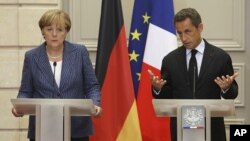The leaders of Germany and France are calling for a common economic government for the 17 nations that employ the euro currency and said all the countries should approve laws by the middle of next year requiring mandatory balanced budgets.
After meeting in Paris Tuesday, French President Nicolas Sarkozy said he and German Chancellor Angela Merkel want a "true European economic government," an effort aimed at controlling the continent's burgeoning debt crisis.
They said the new governmental body should consist of the 17 heads of state of the eurozone countries, be led initially by the current European Union president, Herman Van Rompuy of Belgium, and meet at least twice a year.
Sarkozy and Merkel pledged their support for the euro, and said they would make corporate taxes the same in their two countries, to show that Europe's two biggest economies are "marching in lockstep" to protect the currency.
The German and French leaders met as a new report showed that the continent's economic growth slowed markedly in the April-to-June period, stoking new fears of another global recession. Sluggish growth will also make it more difficult for Europe's debt-laden governments to boost their economic prospects and avoid the international bailouts like those already secured by Greece, Ireland and Portugal.
The European Union reported that the economy in the euro region grew just two-tenths of one percent in the second quarter, a quarter of the rate in the first three months of the year. Germany, with Europe's biggest economy, only advanced a tenth of a percent.
The diminished European growth is one more indication of a slowing global economy, with other governments throughout the world already reporting meager increases in recent months and predicting limited advances the remainder of the year. The U.S., with the world's largest economy, is also faced with slowed economic growth and a contentious political debate about how to reign in deficit spending.
Some financial analysts have suggested that the euro nations need to sell common "Eurobonds" as a way of cementing the actions of the 17 nations on economic matters. But Merkel and Sarkozy ruled out that action, at least for now.
Critics of eurobonds worry that such a step would reduce the incentive for weaker eurozone economies like Greece, which has now been forced to secure two bailouts, to reform their economies, and that the shared higher borrowing costs would punish financially sound countries.
The Merkel-Sarkozy meeting was held a day after the European Central Bank announced it spent almost $32 billion on government debt last week to prop up the bond markets of Spain and Italy.
With Europe continuing to seek measures to satisfy the financial markets, the European Central Bank has been taking a more forceful role in dealing with the crisis.
Germany, France Call for Common Eurozone Economic Government




